- Home
- Rosanne Hawke
The Leopard Princess Page 13
The Leopard Princess Read online
Page 13
Anjuli submitted to the dancing and singing classes, but she told Jahani she enjoyed learning the rabaab, the stringed instrument, the best. The women and girls weren’t allowed in any other area of the fort unless sent for, and since Muzahid was still away, they could relax. Jahani found there were many more girls in the zenana than she first thought: besides servants, there were dancers, singers and storytellers. She wondered if all the girls were Muzahid’s concubines in training. She pursed her lips – she would need to keep a close eye on Anjuli.
21
Askandria Fort
Kingdom of Skardu
One afternoon Jahani sat with Zeb-un-Nissa at a low table watching the girls practise their steps. They were spending more and more time together and Jahani enjoyed the warmth between them, yet it didn’t compensate for being caged. She yawned. Some days it was so hard to stay awake; she still hadn’t regained her health.
‘Are you betrothed to Muzahid, too?’ Jahani asked, gazing at Anjuli dancing.
Zeb-un-Nissa’s tone was bitter. ‘My father wouldn’t give me permission to marry anyone.’
‘Why?’
Instead of answering, she busied herself with a drawstring bag, laying out a board and carved wooden pieces: four tigers and twenty goats. ‘This is a game called Bagh Chal. I’ll be the tigers to start with.’ She placed them on the four corners of the board and gave Jahani the goats. ‘At each turn you put a goat on one of these spaces.’ She indicated the intersecting lines. ‘You mustn’t move them until all twenty are assembled. If I jump over your goat, I eat it.’ She smiled grimly. ‘Remember, the tigers are powerful, but if the goats work together they can trap the tigers.’
Jahani placed a goat on the board; then Zeb-un-Nissa moved a tiger.
‘I believe Anjuli played a game similar to this with the nomad children,’ Jahani said. ‘They drew a grid in the dirt and used stones for tigers and beads or pebbles for the goats.’
‘There are many variations of this game. The nomads in the Hemalleh Mountains developed it. It’s a way to while away long nights in the tents.’ She sighed and out of the blue said, ‘My father didn’t want me supporting my eldest uncle Dara.’ She spoke as though Jahani had only just asked her question about not marrying. ‘I love my father, you understand, but I also loved my uncle. I didn’t want to shun him as I was ordered to do. Even then I thought my uncle Dara would make a wiser, more gracious emperor.’ She jumped a tiger over one of Jahani’s goats. ‘You must try to hem me in or I’ll catch all of your goats.’
Jahani put out another on the edge of the board, this time where it would be safe.
‘You see, my father killed all of my uncles so he could reign, and now he turns a blind eye when war lords and petty rulers terrorise kingdoms and purge them of ethnically different tribes. My father even gives orders to burn Hindu temples. But then if they join our faith, he taxes them. My uncle Dara would not have allowed this. He believed the many colours and creeds of our great empire made it strong. He believed that to stay great is to have tolerance. I am teaching this tolerance to my little brother, Akbar.’
Jahani put out another goat and thought of Anjuli and the burning of her village, that awful smell, and Azhar’s devastated face after he came out of the temple. It was so unjust. All of this destruction by order of the emperor.
‘My father will always be fighting for he chooses not to understand another’s view. The Sunni clerics love him for he talks of all Hindustan becoming Muslim – it is his dream – but he will destroy our Mughal dynasty.’
Zeb-un-Nissa’s tiger took another goat. Jahani wondered how she could possibly win if she couldn’t move her goats out of the way yet.
‘Power hungry men are never content to fulfil their ambitions,’ Zeb-un-Nissa said, watching the board. ‘Once they achieve a goal, they think of the next. They say it is for the benefit of the kingdom or religion. Then they expect people to agree with them or die.’
‘Dagar Khan massacred the royal family to control Hahayul, and the Silk Route,’ Jahani said flatly.
‘Then he will want Nagir, Skardu and Kaghan. And he won’t stop there,’ Zeb-un-Nissa said. ‘He’s been building a palace in the Kingdom of Qashmir, near my father’s summer palace where I often stay.’
‘And after that?’ Jahani said. ‘The empire itself?’
‘Army generals have tried it before.’
Jahani looked carefully at Zeb-un-Nissa. It was clear she knew of the massacre. ‘I should think your father would be grateful to be warned,’ she said carefully.
Zeb-un-Nissa regarded her a moment. ‘You are a true shehzadi. Your parents would have been proud of your diplomacy. Did you know the last ghenish of Hahayul came from Skardu?’
Jahani searched her face. ‘My mother lived in Skardu?’
‘Ji, Muzahid took this fort for himself. Your family members fled and are living elsewhere.’
Jahani looked around the room picturing her mother living here as a girl.
Zeb-un-Nissa regarded her kindly. ‘My aunt Jahanara was fond of your mother. They shared a special friendship. You were named after her.’
‘Truly?’ Jahani stared at her in wonder. ‘I know so little of my background.’
Zeb-un-Nissa jumped over another of Jahani’s goats. ‘It’s impossible for you to win now. You don’t have enough goats to block my moves. This is like chess. My uncle enjoyed playing that game.’
Jahani hoped she’d improve the next time they played.
‘I will see what I can do for you,’ Zeb-un-Nissa said as she put the carved animals away in the drawstring bag. ‘Though the emperor may not be open to receiving letters from me, I could warn the mir of Qashmir. For now, let us write poems and read them to each other. My father does not approve of my poetry and so I must always sign as Makhfi, the hidden one.’
Her comment made Jahani think of Ali Shah and his hidden army; what would he be planning now she was missing? She had to think of a way to stop Dagar Khan, not just sit in Muzahid’s zenana being plumped, like a goat for Eid.
She picked up a peacock quill. She hadn’t written poetry with a friend like this since her lessons with Sameela. She sighed. What would she write? An ode to the friends she had lost? Wise and startling words about the world? Or a song about soaring above it all with Azhar? This sudden thought caught her unaware and her hand hovered above the paper.
She studied the concentration on Zeb-un-Nissa’s face. ‘Have you ever loved a man?’ she asked.
It was Zeb-un-Nissa’s turn to sigh. ‘So much poetry is about love and wine. Ji, I have loved a man, but my father suspected he was in my rooms and visited me one afternoon. We were warned he was approaching, and my lover hid in the large clay urn that we used for heating water. My father looked all around, then lit the fire under the urn. My lover said not a word, for my sake.’
‘Was he saved?’ Jahani whispered.
Zeb-un-Nissa tilted her head. ‘When my father left, I quickly blew out the flame and my eunuch helped me pull him out. He was as red as a crab but he survived. The incident cooled his ardour for me though.’
‘So why doesn’t your father give you permission to marry?’
Again Zeb-un-Nissa told a tale to answer. ‘My grandfather Shah Jahan betrothed me to Uncle Dara’s firstborn son. He should have become emperor one day. I would have been empress. It is what my grandfather wanted.’ Lines of sorrow shadowed her mouth. ‘But it wasn’t to be.’
‘What happened?’
‘My father didn’t approve of Uncle Dara, even then. Nor does he approve of my behaviour. So I come to visit Shayla as often as I can. Besides, she needs my support.’ She bent her head toward the paper in front of her and scratched at it with her quill.
Jahani thought growing up as a princess must be difficult indeed. She’d had no experience, no emperor or tham as father, no paternal authority to tell her what she could or couldn’t do. Her lips tightened. Now many men told her to do what they wanted: to be safe, who to trust, who to marr
y. That would have to change. ‘I was brought up simply, not in a zenana like this.’
‘This is very modest in comparison to where I grew up in Delhi.’
‘Truly? What was it like?’
Zeb-un-Nissa put the quill in the ink bottle. ‘The emperor’s wives all have their own rooms and servants. The more important ones have palaces. There are always entertainments and fun times, plus much intrigue. Each wife wants her son to rule and will do anything to entice my father to notice him or arrange an opportune marriage. The wives all have an income and they can buy land, businesses and villages, even beautiful things like carpets and jewellery, especially at the meena bazaar in Delhi or Lahore. Muzahid cloisters his women like the Mughal emperor but withholds any rewards.’ Zeb-un-Nissa smiled at Jahani, a glint in her eyes. ‘And have you loved a man?’
Jahani hesitated, then, ‘I think so, but I didn’t know it at the time.’
‘Will he be devastated to know that Muzahid has you now?’
‘I’m not sure he is alive.’
‘Ah.’ Zeb-un-Nissa regarded her. ‘You haven’t had an easy time, have you?’
‘Muzahid wants me because of the Kingdom of Hahayul.’
‘Muzahid has the ambitions of a mir but no royal blood, so he needs to marry it to beget a royal son. My cousin, Shayla, has a smidgen of royal blood.’ She paused. ‘My father gave Shayla in marriage because Muzahid apparently rid the empire of some marauding bandits and he deserved a reward.’ Her displeasure at a girl being used as a reward showed in her tight expression.
‘Muzahid and his men are the marauding bandits,’ Jahani said bitterly. ‘They are as bad as Dagar Khan. And to think that if I marry him he will rule in my name and fulfil none of the things I’d like to do. I have to escape from here.’
Zeb-un-Nissa laid a hand on Jahani’s arm. ‘There is always a way. It’s been done before, though I think you are not well enough yet—’
Jahani’s pulse quickened. ‘What do you mean?’
‘See the eunuch over there?’ Zeb-un-Nissa pointed to the tall man who was always guarding the doorway.
Jahani nodded, observing his height and broad shoulders; even the burn mark running down his cheek didn’t detract from his striking appearance.
‘That’s Qadi Ghulam. He watches our every move, but he hates Muzahid. He used to be a salar, a commander in the army in Skardu, but Muzahid cut him, turning him into the eunuch you see today. He will help you.’
‘What if I fight Muzahid? I had a sword—’
Zeb-un-Nissa raised her eyebrows, but Jahani didn’t continue.
‘I’d recommend building up your strength in secret in readiness for your escape and trek home. In the meantime, act weaker than you feel. Now, let’s write our poems.’
Jahani dipped the peacock feather into the ink and wrote Jahanara on her paper. She stroked her nose with the end of the feather, looking at the name and wondering why Yazan was silent. Did he not survive? Yasmeen said the shehzadi would come with a leopard; she couldn’t enter Hahayul without him. Perhaps she wasn’t the real shehzadi after all … She crossed out Jahanara and wrote Jahani. She would always be Jahani. Then she wrote:
My heart is my prison, these halls my sorrow;
I weep but only three tears fall.
One tear for my crumpled friend,
Betrayed and buried in snow.
She would need a plan to escape before Muzahid returned. Muzahid. She shuddered as though ice had slipped down her qameez. It would be weeks until he arrived, maybe more before he would get through the passes, but even though Zeb-un-Nissa was there to keep her busy with games and poems, she couldn’t block out the frantic beating of her heart.
22
Askandria Fort
Kingdom of Skardu
A white horse walked through the low lying wisps of cloud. A woman sat upon it carrying a bowl of soup.
‘Here, Jahani. This will make you well.’
Jahani blinked. The woman sat beside her on the charpai, not on a horse at all. Jahani felt the quilt on top of her sink under the woman’s weight. She opened her eyes wide, but her vision was blurry. Was the woman Vardah, Muzahid’s first wife? It sounded like her raspy tone.
‘Open wide.’ The woman spoke as if Jahani were a child and she obediently opened her mouth. The soup was warm and tasted like one of Hafeezah’s concoctions. She fell back to sleep.
Later, Zeb-un-Nissa roused her with a shake. ‘Come, you must walk around more.’
When Jahani opened her eyes, Zeb-un-Nissa’s looked worried. ‘I know I said to act a little weaker, but you’re not acting, are you?’
‘I should be better soon.’ Jahani groaned. ‘I feel so cold.’
‘But it’s not cool in here,’ Zeb-un-Nissa said.
It was true; in the confined quarters of the zenana, the braziers were always burning.
‘Let’s sit by the window where there is more light and I’ll read to you.’
‘The poet Hafiz?’ Jahani asked as she followed Zeb-un-Nissa.
‘For a day, for just one day …’
Jahani smiled. ‘I like that one.’ And she recited:
‘Talk about that which disturbs no one
And bring some peace into your
Beautiful eyes.’
‘Accha, Jahani, you should take note of the poem and allow yourself some peace.’
Anjuli joined them. She sat next to Jahani on the cushions and stared through the latticed window at a patch of light blue sky outside. Truly they were caged – even though they had food, comfort and entertainment – they were no freer than birds with their wings clipped. Jahani thought of more lines for her own poem as a cloud drifted across the blue:
Two tears for the hundred veils,
Loyal men now silent and gone.
Three tears for all my pride,
Covered now in shame.
She thought of Baqir and Hissam. Azhar, too. The way she treated Azhar when she first thought of him as a lowly protector shamed her now. He hadn’t deserved her disdain.
‘Can we listen?’ Vardah’s children, Dara and Shushu, raced over and sat on the cushions beside Jahani and Anjuli.
‘Certainly,’ Zeb-un-Nissa replied.
‘Are you telling stories or poems?’ Dara asked.
‘We are reading Hafiz’s poems,’ Jahani said. Dara didn’t acknowledge her and instead gazed at Zeb-un-Nissa.
‘Ammi said we aren’t to talk to you,’ Shushu whispered to Jahani, ‘but I think you are nice. I know you wouldn’t kill my brother Dara.’
Jahani started in alarm. ‘Where did you get such an idea?’
‘Ammi said you are dangerous to Dara.’
Jahani glanced at Zeb-un-Nissa, wondering if she had heard, but the lady began to read. Jahani sighed; she hardly recognised herself. She used to be strong and guide people in a crisis. When they were attacked in the forest on the way to Naran she didn’t even have to think – the words to say came to her unbidden. Now she was weak and tired. How could she possibly escape feeling like this?
Jahani stirred when Zeb-un-Nissa finished the poem. ‘Let’s look at the mountains,’ she said.
‘How?’ Dara scoffed, deigning to address her at last. His voice was raspy like Vardah’s.
‘We could climb onto this rail and look out the window. You might be tall enough,’ Jahani said to him.
It was a challenge that a boy of eight could not ignore. ‘Accha, I can do this easily.’ He climbed up to the window.
‘What can you see?’ Shushu asked.
‘Mountains, sky. The snow is bright today.’ He looked down at Jahani, forgetting his animosity. ‘Dekho, look.’
Jahani stood beside him and stared longingly at the snow-covered mountains standing sentinel like mirrors within mirrors. Just then a voice said sharply, ‘Dara, get away from her!’
Jahani spun around to find Vardah glaring at her as if she held a dagger to her son.
Dara gave Jahani a quick grin before jumping onto the
cushions, then both children followed Vardah to their rooms with her berating them the whole way.
Zeb-un-Nissa brought out her drawstring bag and began unpacking the tigers and goats. ‘Shall we play? she asked.
‘Ji,’ replied Jahani. ‘I have a game to show you, Anjuli.’ She pinched the girl’s cheek in affection but there was no cry of excitement from Anjuli.
Jahani frowned. ‘What’s wrong, Anjuli?’
Anjuli shrugged. ‘There’s a eunuch who tells us things.’
‘What sort of things?’ Jahani stopped laying out the game.
‘Like my mother-in-law told me when I was waiting to marry her son.’
Jahani didn’t know what to say. She gathered Anjuli to her. ‘I’ll ask for you to sleep in my room. Would you like that?’
Anjuli nodded.
‘And I’ll make it known that you are my sister and are to be treated as such.’ How could they do this to a girl of ten summers? They may think that Jahani was Muzahid’s ‘property’, but she’d make sure that Anjuli wasn’t seen that way. She made her way over to the tall shadow of the eunuch in the doorway as Anjuli returned to her dancing lesson. ‘Qadi, could Anjuli be moved to my room?’
He bowed slightly. ‘Your wish is my command.’
Her eyes opened wide. She didn’t think it would be so easy. She remembered Zeb-un-Nissa’s words: He hates Muzahid. She said something then that she hoped was wise: ‘If I have any influence, I will do my best for you, Qadi.’
His dark eyes regarded her and, to her surprise, they softened. ‘Thank you, Shehzadi,’ he whispered.
She stared at him, her mouth slightly ajar. He believed who she was.
Just then Shayla appeared beside them. Her face was a mixture of excitement and concern.
‘What is it?’ Zeb-un-Nissa asked, walking over.
‘There has been a message. Muzahid is on his way. I’ve also heard that Dagar Khan is moving more warriors into Hahayul.’
Jahani sat thinking about the news. It stirred the fight within her, but it troubled her that she couldn’t raise any energy.
The waiting for Muzahid to arrive was interminable. One afternoon Qadi took her and Anjuli out onto the balcony. They stared at the snow-covered scene before them. She hadn’t realised that the fort stood on a colossal rock with sheer wooden and stone walls dropping into the river below. She looked around with a sinking heart. It would be near impossible to escape. Then, Jahani noticed wooden steps leading off the balcony, up the wall, probably to the roof. She sighed. If Azhar were here he could fly her up and away to Hahayul.

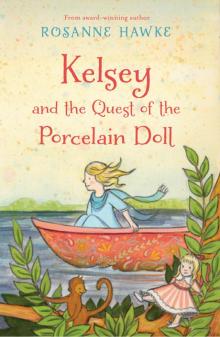 Kelsey and the Quest of the Porcelain Doll
Kelsey and the Quest of the Porcelain Doll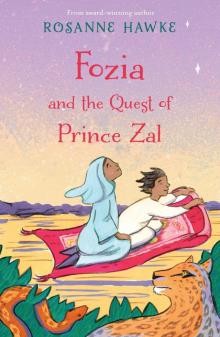 Fozia and the Quest of Prince Zal
Fozia and the Quest of Prince Zal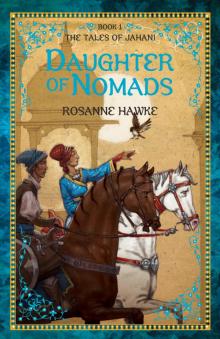 Daughter of Nomads
Daughter of Nomads The Truth About Peacock Blue
The Truth About Peacock Blue Taj and the Great Camel Trek
Taj and the Great Camel Trek The War Within
The War Within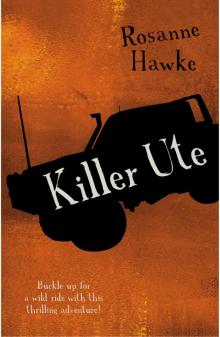 Killer Ute
Killer Ute Shahana
Shahana Kerenza: A New Australian
Kerenza: A New Australian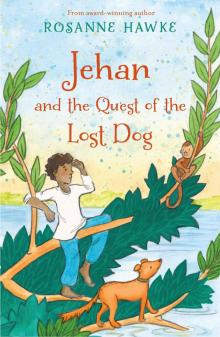 Jehan and the Quest of the Lost Dog
Jehan and the Quest of the Lost Dog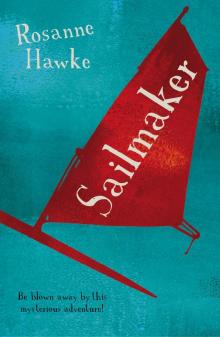 Sailmaker
Sailmaker Zenna Dare
Zenna Dare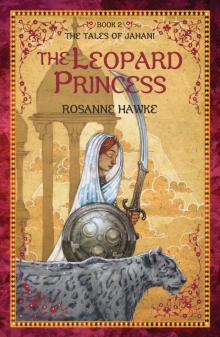 The Leopard Princess
The Leopard Princess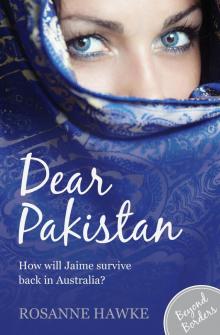 Dear Pakistan
Dear Pakistan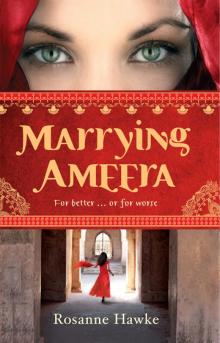 Marrying Ameera
Marrying Ameera Finding Kerra
Finding Kerra Spirit of a Mountain Wolf
Spirit of a Mountain Wolf